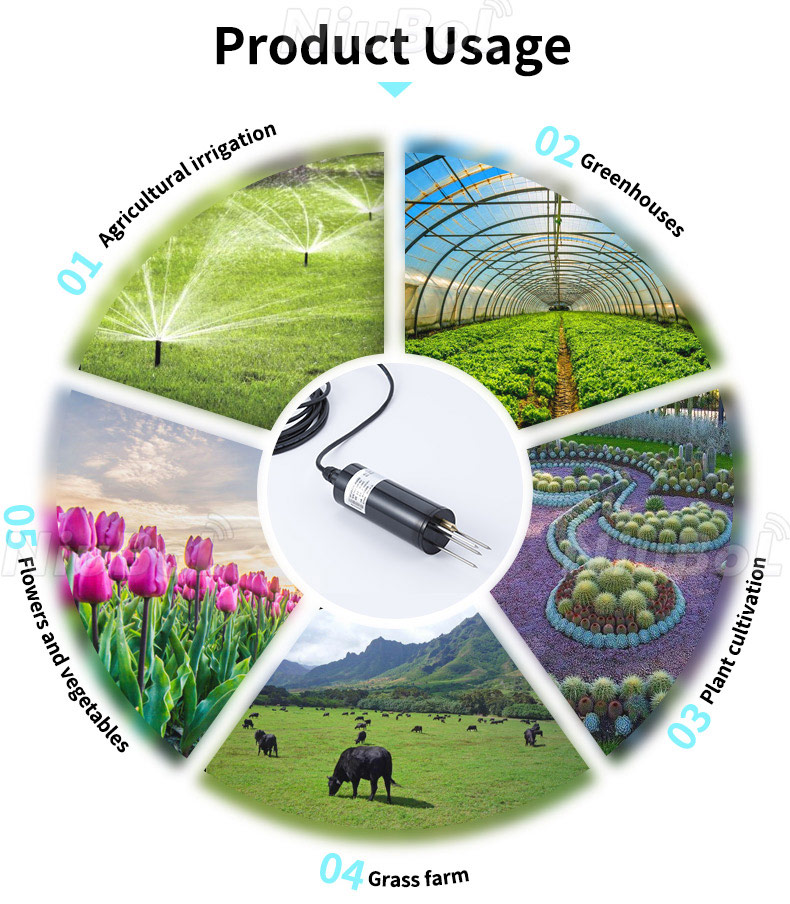

— Blogs —
—Products—
 Consumer hotline +8618073152920
Consumer hotline +8618073152920 WhatsApp:+8615367865107
Address:Room 102, District D, Houhu Industrial Park, Yuelu District, Changsha City, Hunan Province, China
Product knowledge
Time:2024-03-10 20:25:43 Popularity:1111

A soil moisture meter is a valuable tool for monitoring the moisture content of soil in various applications, including agriculture, gardening, landscaping, and environmental monitoring.Here are some reasons why using a soil moisture meter can be beneficial:
1.Optimizing Irrigation: By accurately measuring the moisture level in the soil, you can water your plants more efficiently. Overwatering or underwatering can be detrimental to plant health.A soil moisture meter helps you determine the optimal watering schedule based on the actual moisture content of the soil. By knowing the current soil moisture levels, farmers and irrigation managers can make informed decisions about when and how much to irrigate, thus conserving water resources.
2.Preventing Water Wastage: Monitoring soil moisture levels prevents unnecessary water wastage by ensuring that you only water when needed.This not only conserves water but also reduces water-related costs.
3.Optimizing Crop Yield: Soil moisture directly affects plant growth and productivity. Too much water can lead to root rot and reduce nutrient availability, while too little water can stunt plant growth. Moisture meters help in maintaining the optimal soil moisture content for crop health and yield.
4.Time-Saving: Instead of relying on guesswork or a fixed schedule for watering, a soil moisture meter provides real-time data on the moisture status of the soil.This saves time and effort by taking the guesswork out of watering decisions.
5.Monitoring Soil Conditions: Soil moisture levels can impact other soil properties such as aeration, nutrient availability, and microbial activity.By monitoring soil moisture, you gain insights into the overall health and quality of the soil.
6.Detecting Drainage Issues: In some cases, uneven moisture distribution in the soil can indicate drainage problems or soil compaction.A soil moisture meter can help identify these issues early so that corrective measures can be taken.
7. Weed Management: Moisture levels in the soil can affect weed growth. By monitoring soil moisture, farmers can implement targeted weed control measures, which can be more environmentally friendly and cost-effective.
8. Environmental Monitoring: Researchers use soil moisture meters to study the water cycle, evaluate the impact of climate change on soil moisture patterns, and monitor groundwater levels.


9. Ecological Studies: Soil moisture is a critical factor for many ecological processes. Moisture meters are used in ecological studies to assess the health of ecosystems and the impact of environmental changes on soil moisture dynamics.
10. Pest and Disease Management: Overwatering or underwatering can stress plants and make them more susceptible to pests and diseases. Monitoring soil moisture can help in preventing such stress and associated issues.
11. Climate Change Research: As climate change alters rainfall patterns and temperature, soil moisture levels also change, affecting ecosystems and water resources. Moisture meters contribute to understanding these changes and their potential impacts.
Overall, using a soil moisture meter empowers you to make informed decisions regarding irrigation, plant care, and soil management, leading to healthier plants, efficient resource use, and improved overall garden or agricultural productivity.
Related recommendations
Sensors & Weather Stations Catalog
Agriculture Sensors and Weather Stations Catalog-NiuBoL.pdf
Weather Stations Catalog-NiuBoL.pdf
Related products
 Combined air temperature and relative humidity sensor
Combined air temperature and relative humidity sensor Soil Moisture Temperature sensor for irrigation
Soil Moisture Temperature sensor for irrigation Soil pH sensor RS485 soil Testing instrument soil ph meter for agriculture
Soil pH sensor RS485 soil Testing instrument soil ph meter for agriculture Wind Speed sensor Output Modbus/RS485/Analog/0-5V/4-20mA
Wind Speed sensor Output Modbus/RS485/Analog/0-5V/4-20mA Tipping bucket rain gauge for weather monitoring auto rainfall sensor RS485/Outdoor/stainless steel
Tipping bucket rain gauge for weather monitoring auto rainfall sensor RS485/Outdoor/stainless steel Pyranometer Solar Radiation Sensor 4-20mA/RS485
Pyranometer Solar Radiation Sensor 4-20mA/RS485
Screenshot, WhatsApp to identify the QR code
WhatsApp number:+8615367865107
(Click on WhatsApp to copy and add friends)